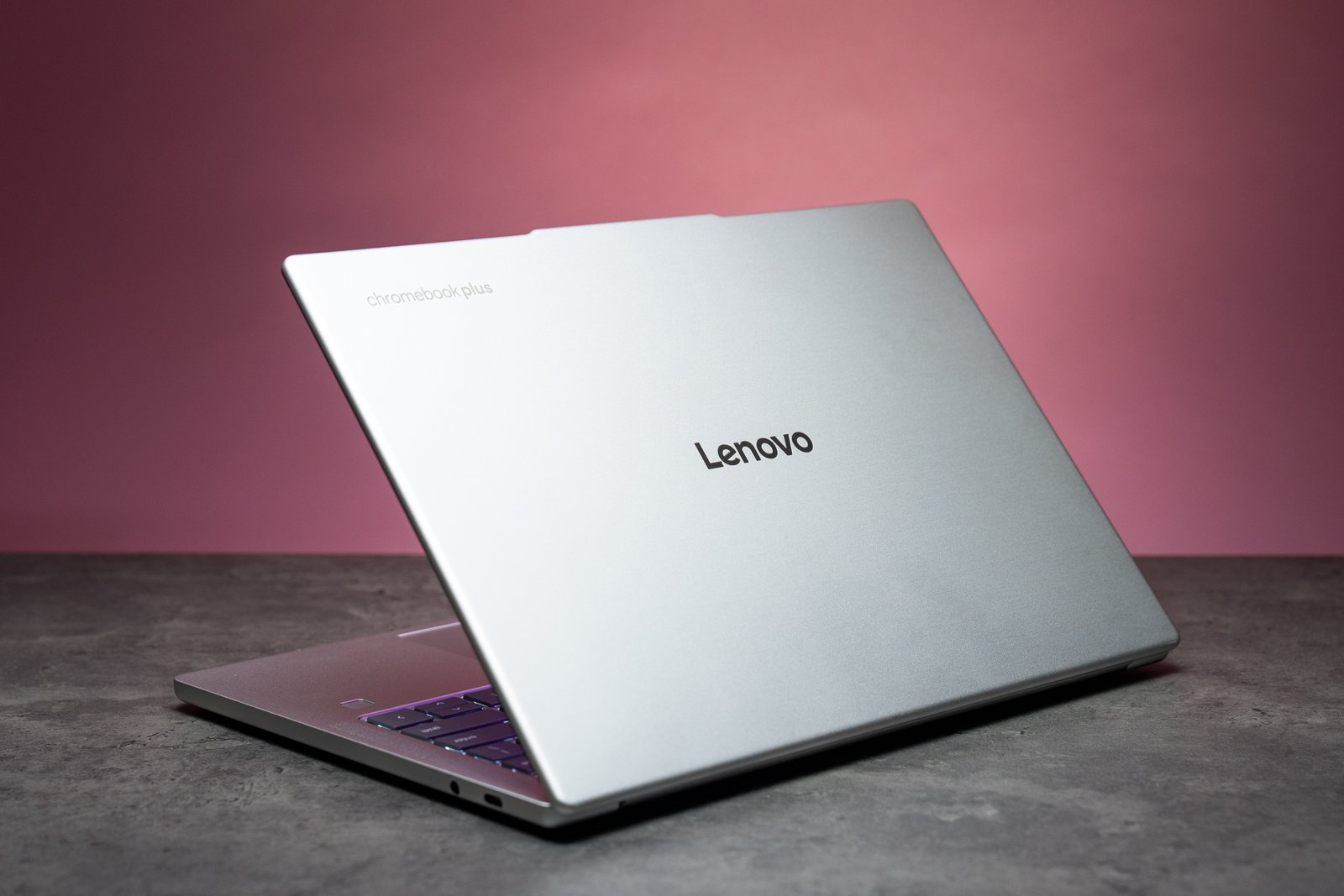The world of Chromebooks has its MacBook Air.
Top Stories
Lenovo Chromebook Plus 14 review: the new king of Chromebooks

Lenovo’s latest Chromebook Plus 14 is an Arm-based thin-and-light with good specs, excellent battery life, a great keyboard, all-around solid build, and a fantastic OLED screen. But the best part is that its bright and punchy 14-inch panel comes standard on the base $649 configuration or as a touchscreen for $749.
That’s cheaper than both the OLED-equipped Samsung Galaxy Chromebook Plus and Acer Chromebook Plus Spin with an IPS screen. It’s also faster than either with more RAM.
The new Chromebook Plus 14 could be a go-to laptop for just about anyone — if you’re okay living with ChromeOS in the first place, of course.
The Lenovo Chromebook Plus 14 starts at $649 with a MediaTek Kompanio Ultra 910 processor, 128GB of storage, 12GB of RAM, and that excellent OLED. Our review config costs $100 more, but it seems worthwhile for double the storage, 16GB of RAM, a touchscreen, and a fingerprint reader. It just weighs slightly more, at 2.78 pounds instead of the base model’s 2.58 pounds. It’s fairly thin at 0.62 inches, and for ports it’s got two USB-C, one USB-A, and a 3.5mm audio jack. The USB-C ports allow you to use up to two external 4K monitors in tandem with the built-in display, though they’re a slow 5Gbps.
- Screen: A
- Webcam: C
- Mic: C
- Keyboard: A
- Touchpad: C
- Port selection: C
- Speakers: B
- Number of ugly stickers to remove: 2
Hardware-wise, this laptop is nearly faultless, especially for the price. You get a great quality 1920 x 1200 / 60Hz OLED, which isn’t a standout in terms of resolution and refresh rate, but the color and contrast certainly are. There’s plenty of RAM compared to most other Chromebooks, and the keyboard feels just as great as much pricier Lenovo notebooks. The speakers are also quite good, rendering a full sound for music and podcasts, and they can get quite loud. My only small hangups were with the webcam, which looks fine aside from a greenish tint, and the loud, cheap-sounding click of the mechanical trackpad.
The Chromebook Plus 14’s performance is impressive, especially since it’s a completely silent, fanless design like a MacBook Air. The 8-core MediaTek processor paired with 16GB of RAM is powerful enough to easily handle running many Chrome tabs across a couple desktops. I uploaded a few documents to NotebookLM in the background, allowing it to generate some audio overviews, and never bothered to stop using any of my open tabs or Android apps. The Lenovo didn’t break a sweat. I did manage to get the MediaTek chip to slow down a little, but only a couple times. One was an accidental mini torture test — spamming Ctrl+Shift+T a few too many times to reopen a bunch of Chrome tabs and Files app windows.
System |
Lenovo Chromebook Plus 14 / MediaTek Kompanio Ultra 910 8C / 16GB / 256GB |
Samsung Galaxy Chromebook Plus / Intel Core 3 100U 6C / 8GB / 256GB |
Acer Chromebook Plus Spin 714 / Intel Core Ultra 5 115U 8C / 8GB / 256GB |
Microsoft Surface Laptop 13-inch / Snapdragon X Plus 8C / 16GB / 512GB |
Acer Swift 14 AI / Intel Core Ultra 7 258V 8C / 32GB / 1TB |
MacBook Air 13-inch M4 / 10C / 10C / 16GB / 512GB |
|---|---|---|---|---|---|---|
| Geekbench 6 CPU Single | 2448 | 1860 | 1549 | 2437 | 2609 | 3775 |
| Geekbench 6 CPU Multi | 7548 | 5693 | 5493 | 11427 | 10690 | 14899 |
| Geekbench 6 GPU (Vulkan) | 17995 | 8785 | 5392 | N/A | N/A | N/A |
| Price (as tested) | $749 | $699.99 | $799 | $999.99 | $1,299.99 | $1,199 |
Frankly, Chromebooks are mature enough these days that you should expect more than enough performance for everyday multitasking — and the new Lenovo delivers. You can do almost anything in a web browser these days, and the ability to run both Android and Linux apps can fill in a lot of the remaining gaps. But some gaps remain.
Zoom — whether in the browser, the Android app, or the “Zoom for Chromebook” progressive web app — was a buggy mess. The Linux version of Slack didn’t work, since Slack doesn’t have a version of its Linux app compiled for Arm chips. I can get by fine using Slack in a browser, though I much prefer it as a standalone app. So keep in mind this laptop’s architecture may complicate things if you’re planning to use Linux apps.
Unoptimized apps can reduce battery life, but the Lenovo’s 60Wh cell and power-sipping chip make it a battery champ regardless. On a light day running Chrome tabs, progressive web apps, and the Android version of Spotify, I could easily use the Chromebook Plus 14 from the start of my workday around 8AM to deep into the evening. I once started my day with 77 percent battery, used it for around nine hours with minimal standby time, and crossed 5PM with about 20 percent still left in the tank. You can probably get multiple days out of this thing if you’re careful.
1/5
This battery life, combined with the Lenovo’s overall performance and excellent screen, makes it an easy recommendation. An x86 Chromebook will have better Linux compatibility, if that’s important to you, and it’s possible a future Snapdragon X-equipped Chromebook may shake up this space even further. But the fact that you can get the touchscreen version for $749, a lower price than other, slower flagship Chromebook Plus models, makes this Lenovo the best Chromebook offering. It’s not a two-in-one convertible like the Acer Chromebook Plus Spin 714, but it’s more powerful and has a nicer screen. Samsung’s Galaxy Chromebook Plus also has a nice OLED like the Lenovo, but in my testing I found its 16:9 aspect ratio screen irksome (these should have stayed dead on laptops in 2021), and its number pad makes the keyboard feel cramped.
1/3
The Lenovo Chromebook Plus 14 feels like a proper successor to Google’s old Pixelbook, with a great screen and borderline-overkill specs that could actually last the whole 10 years of promised software updates. It’s especially appealing if you want an affordable, mostly hassle-free laptop — with the ability to opt in to some hassle if you want to tinker with Linux. This is the new king of Chromebooks, and overall just a damn good computer.
2025 Lenovo Chromebook Plus 14 (as reviewed)
- Display: 14-inch (1920 x 1200) 60Hz OLED touchscreen
- CPU: MediaTek Kompanio Ultra 910
- RAM: 16GB LPDDR5X
- Storage: 256GB UFS 4.0
- Webcam: 5-megapixel fixed focus, with privacy shutter
- Connectivity: Wi-Fi 7, Bluetooth 5.4
- Ports: 2x USB-C 5Gbps with DisplayPort 1.4 and PD 3.0, 1x USB-A 5Gnps, 3.5mm combo audio jack
- Weight: 2.78 pounds
- Dimensions: 12.37 x 8.63 x 0.62 inches
- Battery: 60Wh
- Price: $749
Photography by Antonio G. Di Benedetto / The Verge
Top Stories
Anthropic pays authors $1.5 billion to settle copyright infringement lawsuit

NEW YORK (AP) — Artificial intelligence company Anthropic has agreed to pay $1.5 billion to settle a class-action lawsuit by book authors who say the company took pirated copies of their works to train its chatbot.
The landmark settlement, if approved by a judge as soon as Monday, could mark a turning point in legal battles between AI companies and the writers, visual artists and other creative professionals who accuse them of copyright infringement.
The company has agreed to pay authors or publishers about $3,000 for each of an estimated 500,000 books covered by the settlement.
“As best as we can tell, it’s the largest copyright recovery ever,” said Justin Nelson, a lawyer for the authors. “It is the first of its kind in the AI era.”
A trio of authors — thriller novelist Andrea Bartz and nonfiction writers Charles Graeber and Kirk Wallace Johnson — sued last year and now represent a broader group of writers and publishers whose books Anthropic downloaded to train its chatbot Claude.
A federal judge dealt the case a mixed ruling in June, finding that training AI chatbots on copyrighted books wasn’t illegal but that Anthropic wrongfully acquired millions of books through pirate websites.
If Anthropic had not settled, experts say losing the case after a scheduled December trial could have cost the San Francisco-based company even more money.
“We were looking at a strong possibility of multiple billions of dollars, enough to potentially cripple or even put Anthropic out of business,” said William Long, a legal analyst for Wolters Kluwer.
U.S. District Judge William Alsup of San Francisco has scheduled a Monday hearing to review the settlement terms.
Anthropic said in a statement Friday that the settlement, if approved, “will resolve the plaintiffs’ remaining legacy claims.”
“We remain committed to developing safe AI systems that help people and organizations extend their capabilities, advance scientific discovery, and solve complex problems,” said Aparna Sridhar, the company’s deputy general counsel.
As part of the settlement, the company has also agreed to destroy the original book files it downloaded.
Books are known to be important sources of data — in essence, billions of words carefully strung together — that are needed to build the AI large language models behind chatbots like Anthropic’s Claude and its chief rival, OpenAI’s ChatGPT.
Alsup’s June ruling found that Anthropic had downloaded more than 7 million digitized books that it “knew had been pirated.” It started with nearly 200,000 from an online library called Books3, assembled by AI researchers outside of OpenAI to match the vast collections on which ChatGPT was trained.
Debut thriller novel “The Lost Night” by Bartz, a lead plaintiff in the case, was among those found in the dataset.
Anthropic later took at least 5 million copies from the pirate website Library Genesis, or LibGen, and at least 2 million copies from the Pirate Library Mirror, Alsup wrote.
The Authors Guild told its thousands of members last month that it expected “damages will be minimally $750 per work and could be much higher” if Anthropic was found at trial to have willfully infringed their copyrights. The settlement’s higher award — approximately $3,000 per work — likely reflects a smaller pool of affected books, after taking out duplicates and those without copyright.
On Friday, Mary Rasenberger, CEO of the Authors Guild, called the settlement “an excellent result for authors, publishers, and rightsholders generally, sending a strong message to the AI industry that there are serious consequences when they pirate authors’ works to train their AI, robbing those least able to afford it.”
The Danish Rights Alliance, which successfully fought to take down one of those shadow libraries, said Friday that the settlement would be of little help to European writers and publishers whose works aren’t registered with the U.S. Copyright Office.
“On the one hand, it’s comforting to see that compiling AI training datasets by downloading millions of books from known illegal file-sharing sites comes at a price,” said Thomas Heldrup, the group’s head of content protection and enforcement.
On the other hand, Heldrup said it fits a tech industry playbook to grow a business first and later pay a relatively small fine, compared to the size of the business, for breaking the rules.
“It is my understanding that these companies see a settlement like the Anthropic one as a price of conducting business in a fiercely competitive space,” Heldrup said.
The privately held Anthropic, founded by ex-OpenAI leaders in 2021, earlier this week put its value at $183 billion after raising another $13 billion in investments.
Anthropic also said it expects to make $5 billion in sales this year, but, like OpenAI and many other AI startups, it has never reported making a profit, relying instead on investors to back the high costs of developing AI technology for the expectation of future payoffs.
The settlement could influence other disputes, including an ongoing lawsuit by authors and newspapers against OpenAI and its business partner Microsoft, and cases against Metaand Midjourney. And just as the Anthropic settlement terms were filed, another group of authors sued Apple on Friday in the same San Francisco federal court.
“This indicates that maybe for other cases, it’s possible for creators and AI companies to reach settlements without having to essentially go for broke in court,” said Long, the legal analyst.
The industry, including Anthropic, had largely praised Alsup’s June ruling because he found that training AI systems on copyrighted works so chatbots can produce their own passages of text qualified as “fair use” under U.S. copyright law because it was “quintessentially transformative.”
Comparing the AI model to “any reader aspiring to be a writer,” Alsup wrote that Anthropic “trained upon works not to race ahead and replicate or supplant them — but to turn a hard corner and create something different.”
But documents disclosed in court showed Anthropic employees’ internal concerns about the legality of their use of pirate sites. The company later shifted its approach and hired Tom Turvey, the former Google executive in charge of Google Books, a searchable library of digitized books that successfully weathered years of copyright battles.
With his help, Anthropic began buying books in bulk, tearing off the bindings and scanning each page before feeding the digitized versions into its AI model, according to court documents. That was legal but didn’t undo the earlier piracy, according to the judge.
Top Stories
College of Charleston instructor among victims killed in Lisbon funicular crash

The College of Charleston confirmed on Friday that one of its instructors was among the 16 people killed in the crash of the popular funicular railway in Lisbon on Wednesday, which shocked Portugal and led to pointed questions about the cause of the accident.
Heather Hall, a member of the faculty of the Department of Teacher Education, was the only American killed in the accident, which also injured 21. Among the dead were five Portuguese citizens, two South Koreans, one Swiss, three British citizens, two Canadians, one French and one Ukrainian, according to the Portuguese police.
Hall had been in Lisbon to speak at a conference, Fran Welch, the dean of the School of Education, said in a statement.
“This is a tragic loss for all of us,” Welch said. “As an alumna of the College (‘97) and a dynamic instructor with a specialization is special education, she shared her love of travel with her students.”
The statement noted that Hall had been a Fulbright Scholar in Ghana and had taken her students on study abroad trips to Italy.
Welch added, “Her energy, kindness and student-centeredness will be deeply missed.”
Hall’s passion for travel is highlighted on her Facebook page which shows photos of her in Havana, Venice and at the Colosseum in Rome.
The wreckage of the funicular, known as the Elevador da Glória, was cleared overnight and put in police custody.
Alexandre Rodrigues, the commander of the Lisbon fire brigade, told reporters Wednesday that authorities were alerted about the derailment at 6:01 p.m. local time (12:01 p.m. ET) and arrived within three minutes. The funicular derailed and crashed into a building, he said.
Becky Britton, of Minnesota, was vacationing in the city with her husband when she walked past the scene and saw what she described as carnage.
“I feel sad, and when you’re here it’s real. If it happened to us, our families, we would have been notified and that’s just devastating,” she said.
Emergency officials said all victims were pulled out of the wreckage in just over two hours.
Classified as a national monument, the Elevador da Glória funicular connected Restauradores Square to the Jardim de São Pedro de Alcântara, a popular garden in the Bairro Alto neighborhood.
The service, which was inaugurated in 1885, goes up and down a few hundred yards of a hill on a curved, traffic-free road in tandem with one going the opposite way. It is a popular attraction with Lisbon’s tourists, and long lines of people typically form for the brief rides.
Harnessed by steel cables, it can carry more than 40 people, seated and standing, and it is also commonly used by Lisbon residents.
The government’s Office for Air and Rail Accident Investigations is expected to release a preliminary technical report on the accident on Saturday.
Top Stories
Chiefs vs. Chargers live updates: Game score, analysis, highlights as AFC West rivals meet in Brazil

The 2025 NFL season is here, and Brazil is the host of a clash between AFC West heavyweights Friday night: the three-time defending conference champion Kansas City Chiefs and 2024 wild card Los Angeles Chargers.
There’s plenty of fun matchups all over the field. Los Angeles returns much of its defensive core that comprised the NFL’s No. 1 scoring defense for the first of two showdowns with the Chiefs’ dynamic future Hall of Fame duo of quarterback Patrick Mahomes and tight end Travis Kelce. Kansas City will counter Chargers Pro Bowl quarterback Justin Herbert, fresh off a career year in 2024, with the league’s No. 4 scoring defense (19.2 points per game allowed) from a year ago.
It’s also a near guarantee Friday night’s showdown will go down to the wire even though the Chiefs have won the past seven matchups. Six of those meetings were one-score games.
Will the Chiefs, whose 17-game winning streak in one-score games including the playoffs is the longest in NFL history, escape with another narrow victory over their division rivals? Or will the ball finally bounce the Chargers’ way under the lights in Sao Paulo?
Keep it locked here as CBS Sports provides you with live updates, highlights and analysis as the Chiefs battle the Chargers in Week 1.
Where to watch Chiefs vs. Chargers
- Date: Friday, Sept. 5 | Time: 8 p.m. ET
- Location: Corinthians Arena (Sao Paulo, Brazil)
- Stream: YouTube
- Follow: CBS Sports App
- Odds: Chiefs -3; O/U 47.5 (via FanDuel Sportsbook)
-

 Business1 week ago
Business1 week agoThe Guardian view on Trump and the Fed: independence is no substitute for accountability | Editorial
-
Tools & Platforms4 weeks ago
Building Trust in Military AI Starts with Opening the Black Box – War on the Rocks
-

 Ethics & Policy1 month ago
Ethics & Policy1 month agoSDAIA Supports Saudi Arabia’s Leadership in Shaping Global AI Ethics, Policy, and Research – وكالة الأنباء السعودية
-

 Events & Conferences4 months ago
Events & Conferences4 months agoJourney to 1000 models: Scaling Instagram’s recommendation system
-

 Jobs & Careers2 months ago
Jobs & Careers2 months agoMumbai-based Perplexity Alternative Has 60k+ Users Without Funding
-

 Education2 months ago
Education2 months agoVEX Robotics launches AI-powered classroom robotics system
-

 Funding & Business2 months ago
Funding & Business2 months agoKayak and Expedia race to build AI travel agents that turn social posts into itineraries
-

 Podcasts & Talks2 months ago
Podcasts & Talks2 months agoHappy 4th of July! 🎆 Made with Veo 3 in Gemini
-

 Education2 months ago
Education2 months agoMacron says UK and France have duty to tackle illegal migration ‘with humanity, solidarity and firmness’ – UK politics live | Politics
-

 Podcasts & Talks2 months ago
Podcasts & Talks2 months agoOpenAI 🤝 @teamganassi
























